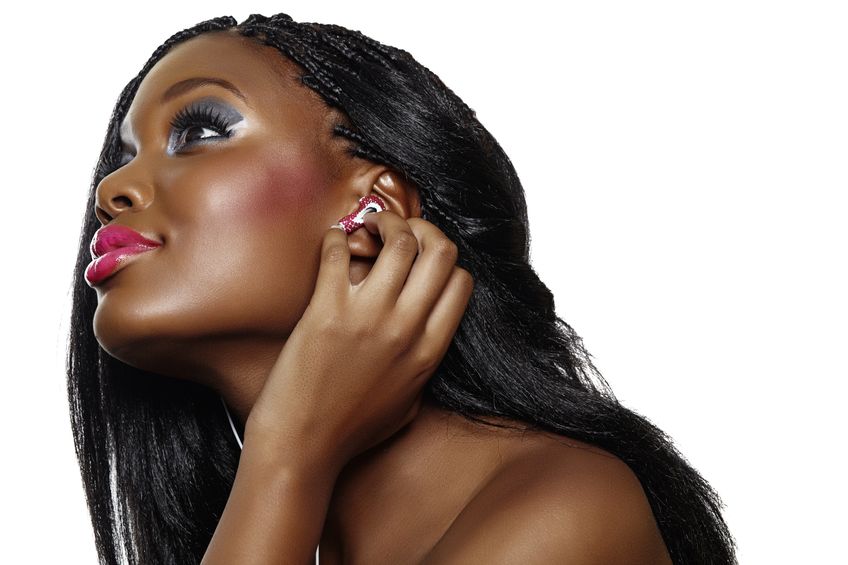Does My Skin Color Affect my Skin’s Condition?

skin care products we choose and the type of spa treatments we should have. Sensitive, oily and extreme dry skin problems affect people’s skincare choices in general, regardless of ethnicity. Geographic origin is a consideration when we look at how people from different regions of the world have traditionally treated and maintained skin for maximum health. However, some facts cannot be overlooked. For example the amount of melanin in skin varies depending on the shade of skin color. Fair skin is more prone to freckles and sunburn from sun exposure. Darker skin tends to have more melanin, thus, a bit more resistance to damage from sun exposure. Dark skin is not necessarily exceptional from the risk of skin cancer, but occurrences are fewer in people with darker skin tones.  Melanin is a natural protective barrier that shields skin from potential harm from solar UV rays—the more you have in your skin the stronger the barrier. Of course anyone concerned with the health of their skin should wear sunscreen no matter how dark their skin--it may be the simple difference in the SPF strength of the sunscreen you choose. ACNE While skin irritations like rosacea and inflammation of the skin may reveal more redness in the skin of lighter tones, dark blemishes from acne are more visible on darker skin in general. Tampering with acne by picking at the skin will reveal scarring differently depending on the color of the skin. All skin, no matter what color, that is not properly maintained through hygiene and diet is prone to acne. Although not acne, but just as agitating, razor bumps in male skin is much more likely in men of color than in white men. There is a visual difference in how certain conditions play out on skin depending on the color the person. DRY SKIN A friend shared with me a story of a visit to a dermatologist as she had an odd scaly blemish on her leg that grew over time. When the doctor’s tried and fail to diagnose it, the disclaimer was that they did not usually have brown skinned patients. The appearance of lichenus planus, as the condition was discovered, appeared differently on darker skin than on the fair-skinned patients that frequented the clinic. Sadly, a misdiagnosis is hardly excusable but not unusual. Prescribing steroid cream for skin conditions because of an improper diagnosis in no laughing matter, but that was exactly what happened to my frustrated friend. Dr. Susan Taylor (www.brownskin.net) reported that eczema is most common among people with brown skin including those of African, Latino and Asian backgrounds. She noted studies that found higher instances of eczema among Mexican American adolescents than white or African Americans. Another study found that Vietnamese and Chinese infants had higher rates of eczema than white infants. While no race is entirely exempt from this skin condition, the dry, itchy flaky symptoms of eczema and psoriasis are more apparent on darker skin overall. Although it is treatable, the hyperpigmentation as a result of outbreaks is also more of a concern because of the permanent unsightly blemishes left behind on people of color. The goal for people in general, regardless of skin color, is to ensure balance and enhance well being in their skin and bodies. Using historically reliable natural skin remedies as a guide, we should consider our individual sensitivities based on personal experience and select from the current quality organic skincare options available to us for the most nourished healthiest skin possible. Finally start reaping the benefits of superior skin care today and stop wondering if you can have beautiful skin. Call for your appointments NOW at 212.949.2350 and if you are a first time client GET $50 off your first treatment. P.S Follow us on Facebook or Twitter and if you want essential skin care tips and tricks sign up to our newsletter, bottom of the page under in the box “Sign Up For Updates”.]>>
Melanin is a natural protective barrier that shields skin from potential harm from solar UV rays—the more you have in your skin the stronger the barrier. Of course anyone concerned with the health of their skin should wear sunscreen no matter how dark their skin--it may be the simple difference in the SPF strength of the sunscreen you choose. ACNE While skin irritations like rosacea and inflammation of the skin may reveal more redness in the skin of lighter tones, dark blemishes from acne are more visible on darker skin in general. Tampering with acne by picking at the skin will reveal scarring differently depending on the color of the skin. All skin, no matter what color, that is not properly maintained through hygiene and diet is prone to acne. Although not acne, but just as agitating, razor bumps in male skin is much more likely in men of color than in white men. There is a visual difference in how certain conditions play out on skin depending on the color the person. DRY SKIN A friend shared with me a story of a visit to a dermatologist as she had an odd scaly blemish on her leg that grew over time. When the doctor’s tried and fail to diagnose it, the disclaimer was that they did not usually have brown skinned patients. The appearance of lichenus planus, as the condition was discovered, appeared differently on darker skin than on the fair-skinned patients that frequented the clinic. Sadly, a misdiagnosis is hardly excusable but not unusual. Prescribing steroid cream for skin conditions because of an improper diagnosis in no laughing matter, but that was exactly what happened to my frustrated friend. Dr. Susan Taylor (www.brownskin.net) reported that eczema is most common among people with brown skin including those of African, Latino and Asian backgrounds. She noted studies that found higher instances of eczema among Mexican American adolescents than white or African Americans. Another study found that Vietnamese and Chinese infants had higher rates of eczema than white infants. While no race is entirely exempt from this skin condition, the dry, itchy flaky symptoms of eczema and psoriasis are more apparent on darker skin overall. Although it is treatable, the hyperpigmentation as a result of outbreaks is also more of a concern because of the permanent unsightly blemishes left behind on people of color. The goal for people in general, regardless of skin color, is to ensure balance and enhance well being in their skin and bodies. Using historically reliable natural skin remedies as a guide, we should consider our individual sensitivities based on personal experience and select from the current quality organic skincare options available to us for the most nourished healthiest skin possible. Finally start reaping the benefits of superior skin care today and stop wondering if you can have beautiful skin. Call for your appointments NOW at 212.949.2350 and if you are a first time client GET $50 off your first treatment. P.S Follow us on Facebook or Twitter and if you want essential skin care tips and tricks sign up to our newsletter, bottom of the page under in the box “Sign Up For Updates”.]>>
 Melanin is a natural protective barrier that shields skin from potential harm from solar UV rays—the more you have in your skin the stronger the barrier. Of course anyone concerned with the health of their skin should wear sunscreen no matter how dark their skin--it may be the simple difference in the SPF strength of the sunscreen you choose. ACNE While skin irritations like rosacea and inflammation of the skin may reveal more redness in the skin of lighter tones, dark blemishes from acne are more visible on darker skin in general. Tampering with acne by picking at the skin will reveal scarring differently depending on the color of the skin. All skin, no matter what color, that is not properly maintained through hygiene and diet is prone to acne. Although not acne, but just as agitating, razor bumps in male skin is much more likely in men of color than in white men. There is a visual difference in how certain conditions play out on skin depending on the color the person. DRY SKIN A friend shared with me a story of a visit to a dermatologist as she had an odd scaly blemish on her leg that grew over time. When the doctor’s tried and fail to diagnose it, the disclaimer was that they did not usually have brown skinned patients. The appearance of lichenus planus, as the condition was discovered, appeared differently on darker skin than on the fair-skinned patients that frequented the clinic. Sadly, a misdiagnosis is hardly excusable but not unusual. Prescribing steroid cream for skin conditions because of an improper diagnosis in no laughing matter, but that was exactly what happened to my frustrated friend. Dr. Susan Taylor (www.brownskin.net) reported that eczema is most common among people with brown skin including those of African, Latino and Asian backgrounds. She noted studies that found higher instances of eczema among Mexican American adolescents than white or African Americans. Another study found that Vietnamese and Chinese infants had higher rates of eczema than white infants. While no race is entirely exempt from this skin condition, the dry, itchy flaky symptoms of eczema and psoriasis are more apparent on darker skin overall. Although it is treatable, the hyperpigmentation as a result of outbreaks is also more of a concern because of the permanent unsightly blemishes left behind on people of color. The goal for people in general, regardless of skin color, is to ensure balance and enhance well being in their skin and bodies. Using historically reliable natural skin remedies as a guide, we should consider our individual sensitivities based on personal experience and select from the current quality organic skincare options available to us for the most nourished healthiest skin possible. Finally start reaping the benefits of superior skin care today and stop wondering if you can have beautiful skin. Call for your appointments NOW at 212.949.2350 and if you are a first time client GET $50 off your first treatment. P.S Follow us on Facebook or Twitter and if you want essential skin care tips and tricks sign up to our newsletter, bottom of the page under in the box “Sign Up For Updates”.]>>
Melanin is a natural protective barrier that shields skin from potential harm from solar UV rays—the more you have in your skin the stronger the barrier. Of course anyone concerned with the health of their skin should wear sunscreen no matter how dark their skin--it may be the simple difference in the SPF strength of the sunscreen you choose. ACNE While skin irritations like rosacea and inflammation of the skin may reveal more redness in the skin of lighter tones, dark blemishes from acne are more visible on darker skin in general. Tampering with acne by picking at the skin will reveal scarring differently depending on the color of the skin. All skin, no matter what color, that is not properly maintained through hygiene and diet is prone to acne. Although not acne, but just as agitating, razor bumps in male skin is much more likely in men of color than in white men. There is a visual difference in how certain conditions play out on skin depending on the color the person. DRY SKIN A friend shared with me a story of a visit to a dermatologist as she had an odd scaly blemish on her leg that grew over time. When the doctor’s tried and fail to diagnose it, the disclaimer was that they did not usually have brown skinned patients. The appearance of lichenus planus, as the condition was discovered, appeared differently on darker skin than on the fair-skinned patients that frequented the clinic. Sadly, a misdiagnosis is hardly excusable but not unusual. Prescribing steroid cream for skin conditions because of an improper diagnosis in no laughing matter, but that was exactly what happened to my frustrated friend. Dr. Susan Taylor (www.brownskin.net) reported that eczema is most common among people with brown skin including those of African, Latino and Asian backgrounds. She noted studies that found higher instances of eczema among Mexican American adolescents than white or African Americans. Another study found that Vietnamese and Chinese infants had higher rates of eczema than white infants. While no race is entirely exempt from this skin condition, the dry, itchy flaky symptoms of eczema and psoriasis are more apparent on darker skin overall. Although it is treatable, the hyperpigmentation as a result of outbreaks is also more of a concern because of the permanent unsightly blemishes left behind on people of color. The goal for people in general, regardless of skin color, is to ensure balance and enhance well being in their skin and bodies. Using historically reliable natural skin remedies as a guide, we should consider our individual sensitivities based on personal experience and select from the current quality organic skincare options available to us for the most nourished healthiest skin possible. Finally start reaping the benefits of superior skin care today and stop wondering if you can have beautiful skin. Call for your appointments NOW at 212.949.2350 and if you are a first time client GET $50 off your first treatment. P.S Follow us on Facebook or Twitter and if you want essential skin care tips and tricks sign up to our newsletter, bottom of the page under in the box “Sign Up For Updates”.]>>






